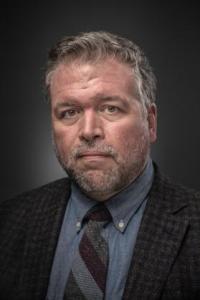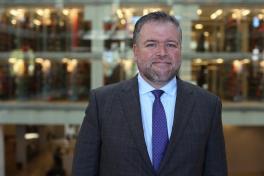Bear Braumoeller recognized as a 2021 AAAS Fellow

Professor Bear Braumoeller was one of seven Ohio State scientists inducted into the 2021 Class of Fellows for the American Association for the Advancement of Science (AAAS). The AAAS fellowship is regarded as one of the most prestigious honors a United States scientist can receive. AAAS Fellows are elected by the AAAS Council annually.
As the AAAS fellowship process page details, "AAAS Fellows are a distinguished cadre of scientists, engineers and innovators who have been recognized for their achievements across disciplines, from research, teaching, and technology, to administration in academia, industry and government, to excellence in communicating and interpreting science to the public."
Braumoeller was selected as an AAAS fellow "for distinguished contributions to the fields of political methodology, social science theory and applied policy analysis." (Emily Caldwell with Ohio State News).
Braumoeller and MESO Lab win NSF award to study international conflict and international order
Bear Braumoeller, Professor in the Department of Political Science and head of the MESO Lab (Modeling Emergent Social Order), along with the MESO Lab research team won a National Science Foundation (NSF) grant of nearly $750,000 to assist with research from 2021-2024.

Combined with a grant of $200,000 from the Carnegie Corporation of New York received in May 2020, Braumoeller and the MESO LAB research team are able to conduct faster-paced research on the relationship between international order and international conflict.
The research, according to the abstract of the NSF award, hopes for several impacts: "improves understanding of the order-conflict relationship; further expands the geographic boundaries of the study of international order and support for order beyond the Western world; and provides a more concrete foundation for policy recommendations that meaningfully enhance national security."
In order to achieve these impacts, the research will include "the development of computational network models relating international order, domestic political order, and conflict; the extension of those models beyond the context of the Western World, specifically to incorporate Eastern understandings of order; the validation and calibration of those models on original, multi-country survey data; and the development of original network measures of order and uncertainty" (NSF award abstract).
The MESO Lab will be at the heart of this research. On their website, the Meso Lab is described as "a group of social-science graduate students who are interested in studying international order and international and subnational conflict using computational methods and translating the results for a general audience."
When asked in an article by the College of Arts and Sciences about his research, Braumoeller noted the significant value of the graduate students in providing support in the MESO lab's operations.
“I would say the students are really the heart of this lab,” he said. “I’ve done a bunch of things individually, but I can tell you things with my name on them are much smarter when they come out of this lab, and a lot of that has to do with the fantastic students I work with.”
One student in the MESO Lab is International Relations and Political Methodology Ph.D. candidate, Alan van Beek. van Beek discussed the impact the team mentality has on the research project's success.
"Bear’s approach has really been focused on trying to empower us and give us the tools and autonomy to lead projects, to take initiative to carry the project in directions we thought were interesting. His input was much more that of a benevolent steward who makes sure we are productive, and we are really doing our best work and improving our skills as researchers" (College of Arts and Sciences).
As the MESO Lab continues research with this new funding, Braumoeller says he will enjoy the collaborative environment in the process.
"This is a collaboration among people who treat each other as equals in the production of knowledge. This is just the best professional collaboration I’ve ever had, and it’s really incredibly rewarding" (College of Arts and Sciences).
